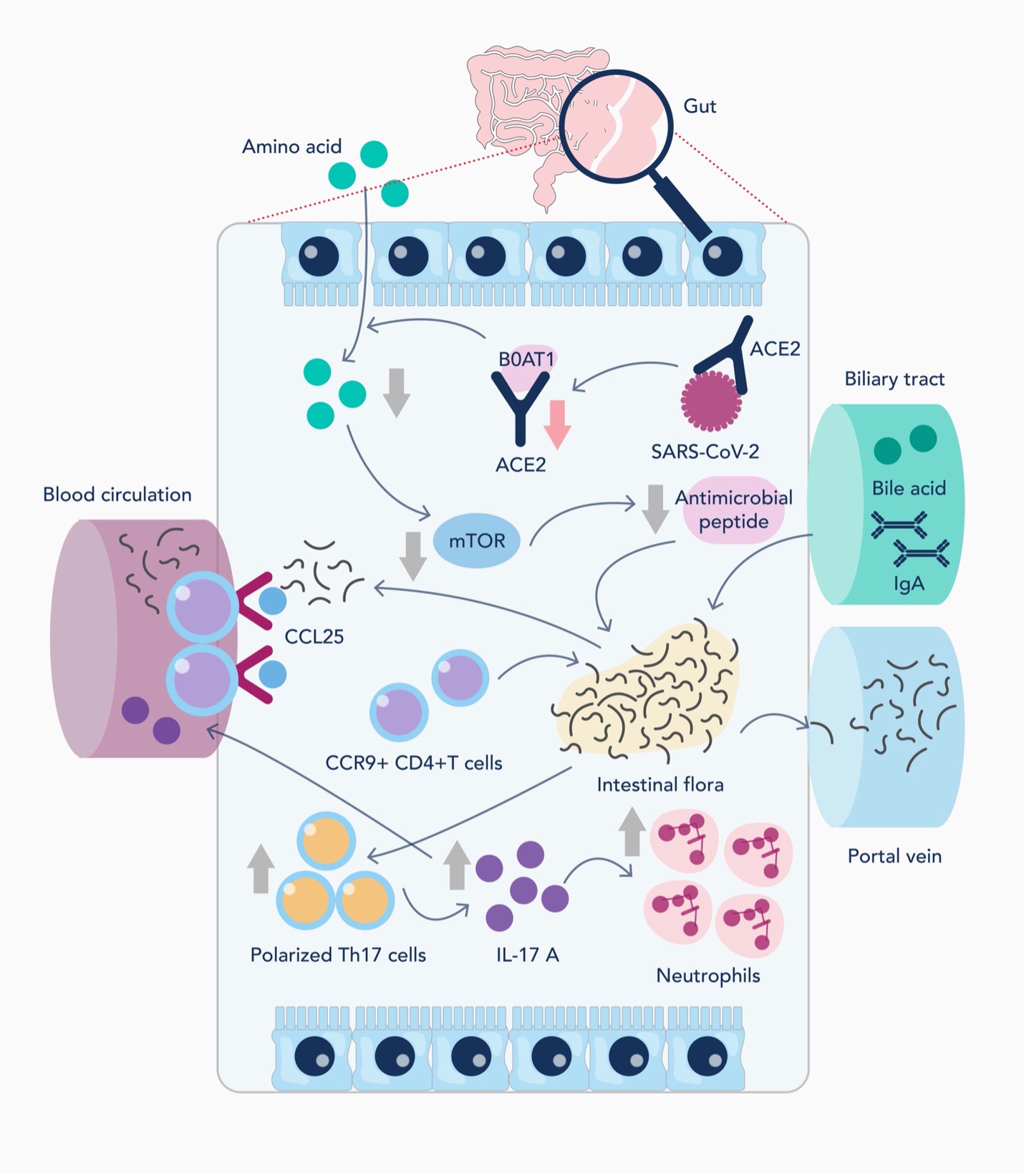Long-Term Effects of COVID-19 on the Gastrointestinal System
Written by Rahul Panchal, Scientist II at Proteintech Group in Chicago, IL.
Gastrointestinal issues following COVID-19 have long been known as a side effect of infection. In this blog, we detail some of the mechanisms causing long-term intestinal side effects due to increased inflammation, and the highlight some reagents needed to help research these effects.
COVID-19 increases gut inflammation
Due to high levels of ACE2 receptor expression in intestinal tissue, the gastrointestinal system is often targeted by SARS-COV-2 infections. The virus occupies the ACE2 receptor, thereby preventing it from converting angiotensin II into Ang 1-7. Under normal circumstances, the routine conversion of angiotensin II to Ang 1-7 is important as it promotes an anti-inflammatory state. However, when ACE2 receptors are occupied by SARS-COV-2, the level of angiotensin II accumulates resulting in a pro-inflammatory state due to increased NAPDH activity, thrombogenic factors, vasoconstriction, and pro-inflammatory cytokines.
COVID-19 infection in the intestine typically results in increased immune cell recruitment and activation. The high expression of CCL25 on intestinal cells results in the recruitment of CCR9-CD4+ T cells. The persistence of the SARS-CoV-2 virus several months after the acute phase of the infection has been linked to increased serum levels of interferons and chemokines as well as an expansion of activated immune cell types such as PD1+ CD8+/TIM3+CD8+ memory T cells and CD86+CD38+ dendritic cells. Elevated levels of these cell have been found as late as 8 months post-infection. As these immune cells circulate, they continue to produce and release high-levels of pro-inflammatory cytokines such as IL-1 beta, IL-6, and TNF alpha.

Mechanisms of SARS-CoV-2 inflammatory effects on the gastrointestinal tract. Figure adapted from Ye et al., 2020.
COVID-19 and the microbiome
There is also evidence to suggest that COVID-19 infection disrupts the microbial balance in the intestine, which results in further downstream consequences. Healthy microbiomes typically work to inhibit the action of pro-inflammatory cytokines and promote gut barrier integrity through upregulation of tight junction proteins and increased mucus production. Disruption of the intestinal microbiome can be triggered by the increased recruitment of CCR9-CD4+ T cells. Additionally, through occupying the ACE2 receptor, SARS-CoV-2, blocks the action of the B0AT1 transporter protein, whose activity is co-dependent upon ACE2. B0AT1 aids in the transport of helpful amino acids, such as tryptophan across the cell membrane. Tryptophan absorption by intestinal cells promotes signaling pathways that increase the production of anti-microbial peptides, which in turn help to regulate microbial homeostasis in the gut. When tryptophan cannot be absorbed due to blocked access to B0AT1, this leads to reduced anti-microbial peptide secretion and microbiome dysbiosis. This condition has been linked to increased pro-inflammatory cytokines and decreased barrier tightness. The loss of barrier integrity has been shown to be a major cause of post-acute phase symptoms such as abdominal pain and diarrhea.
Associated Products: Immune Cell Markers
Target |
SKU |
Applications |
| CD14 | 17000-1-AP/60253-1-Ig | WB, IHC, IF, FC, ELISA |
| CCR9/ACKR2 | 60046-1-Ig/11386-1-AP | IHC, IF, ELISA |
| CD86 | 13395-1-AP | WB, IF, FC, ELISA |
| CD38 | 60006-1-Ig/25284-1-AP | WB, IHC, IF, FC, ELISA |
| CD4 | 67786-1-Ig | IHC, IF, ELISA |
| CD8 | 66868-1-Ig | WB, IHC, IF, FC, ELISA |
| CD16 | 66779-2-Ig/16559-1-AP | WB, IHC, IF, FC, ELISA |
| PD1 | 18106-1-AP | IHC, IF, FC, CoIP, ELISA |
| TIM3 | 60355-1-Ig/11872-1-AP | WB, IHC, FC, ELISA |
ELISA Kits for Cytokine Secretion
Target |
SKU |
Range |
| IL-1 beta | KE00021 | 3.9-250 pg/mL |
| IL-6 | KE00139 | 7.8-500 pg/mL |
| TNF alpha | KE00154 | 15.6-500 pg/mL |
| IFN beta | KE00195 | 7.8-500 pg/mL |
| IFN lambda 1/IL-29 | KE00241 | 62.5-4000 pg/mL |
Gap Junction Proteins
Target |
SKU |
Applications |
| Claudin 2 | 26912-1-AP | WB, IF, ELISA |
| Claudin 7 | 10118-1-AP | IHC, IF, ELISA |
| Occludin | 13409-1-AP | WB, IP, IHC, FC, ELISA |
| ZO-1 | 66542-1-Ig | WB, IHC, IF, ELISA |
Intestinal Cell Markers
Target |
SKU |
Applications |
| Angiopoietin 1 | 23302-1-AP | WB, IHC, IF, ELISA |
| CCL25 | 25285-1-AP | IHC, IF, ELISA |
| B0AT1/SLC6A19 | 29372-1-AP | WB, IHC, ELISA |
References:
1. Meringer, H., & Mehandru, S. (2022). Gastrointestinal post-acute COVID-19 syndrome. Nature Reviews Gastroenterology &Amp; Hepatology, 19(6), 345–346. https://doi.org/10.1038/s41575-022-00611-z
2. Phetsouphanh, C., Darley, D. R., Wilson, D. B., Howe, A., Munier, C. M. L., Patel, S. K., Juno, J. A., Burrell, L. M., Kent, S. J., Dore, G. J., Kelleher, A. D., & Matthews, G. V. (2022). Immunological dysfunction persists for 8 months following initial mild-to-moderate SARS-CoV-2 infection. Nature Immunology, 23(2), 210–216. https://doi.org/10.1038/s41590-021-01113-x
3. Wu, X., Jing, H., Wang, C., Wang, Y., Zuo, N., Jiang, T., Novakovic, V. A., & Shi, J. (2022). Intestinal Damage in COVID-19: SARS-CoV-2 Infection and Intestinal Thrombosis. Frontiers in Microbiology, 13. https://doi.org/10.3389/fmicb.2022.860931
4. Ye Q, Wang B, Zhang T, Xu J, Shang S. The mechanism and treatment of gastrointestinal symptoms in patients with COVID-19. Am J Physiol Gastrointest Liver Physiol. 2020 Aug 1;319(2):G245-G252. doi: 10.1152/ajpgi.00148.2020. Epub 2020 Jul 8. PMID: 32639848; PMCID: PMC7414235.
5. Yusuf, F., Fahriani, M., Mamada, S. S., Frediansyah, A., Abubakar, A., Maghfirah, D., Fajar, J. K., Maliga, H. A., Ilmawan, M., Emran, T. B., Ophinni, Y., Innayah, M. R., Masyeni, S., Ghouth, A. S. B., Yusuf, H., Dhama, K., Nainu, F., & Harapan, H. (2021). Global prevalence of prolonged gastrointestinal symptoms in COVID-19 survivors and potential pathogenesis: A systematic review and meta-analysis. F1000Research, 10, 301. https://doi.org/10.12688/f1000research.52216.1
Related Content
Neuropilin-1 joins ACE2 as SARS-CoV-2 gateway
How Nanobodies could advance Sars-CoV diagnostics
Replication Race: Scientists unravel why Omicron spreads faster
The multi-organ impact of COVID-19
Support
Newsletter Signup
Stay up-to-date with our latest news and events. New to Proteintech? Get 10% off your first order when you sign up.